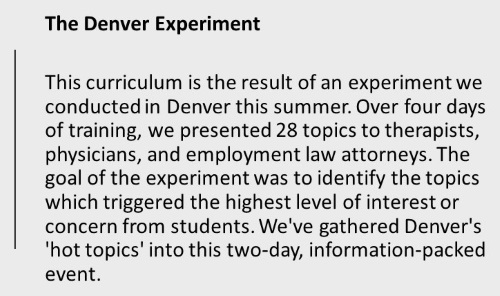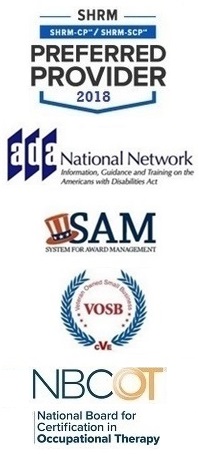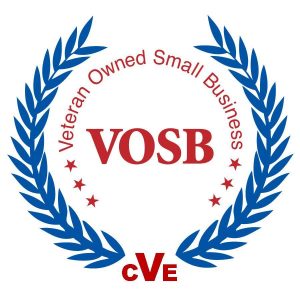Advanced Functional Capacity Evaluation and Post-Offer Testing Best Practices Under Title I of the Americans with Disabilities Act and the Rehabilitation Act of 1973
Presented Live and In-Person by Roy Matheson, MTM, ADAC
A Matheson Essentials Workshop
The Course
Highly experienced occupational therapists and physical therapists are re-entering the field of employment testing. They join current work evaluation practitioners who appreciate the need to update their knowledge of the federal rules guiding Post-Offer Employment Testing (POET) and Functional Capacity Evaluation (FCE). The majority of our students have significant experience in POET and FCE. The cohort has at least five years of work evaluation experience; some have twenty years of experience. Many have achieved status as a content expert in work evaluation.
However, the focus of this one-of-a-kind training is you: we intend to deliver the knowledge you need to serve employers, job applicants, and employees while complying with Title I of the Americans with Disabilities Act and the Rehabilitation Act of 1973.
Suggestion: if you have not been trained in the administration of a POET or FCE, we recommend that you participate in a high-quality program such as those provided by Matheson Education and Training Solutions (METS). Click here for more information.
The course curriculum includes nine general areas of practice. The curriculum begins with an introduction to the federal guidelines for testing before discussing changes to pre-test clinical policies and procedures. After laying this foundation for practice, the course examines each of the changed aspects of the services you now offer. We then explore the role of physical and cognitive essential function job analysis on valid employment test practices. This section of the training will include a hands-on practicum of a cognitive essential function job analysis tool. This course focuses on increasing your clinical knowledge and set of skills. We will conclude with a discussion of how to begin offering selected services to your local community.
How Your Workers’ Compensation, Stay-at-Work, and POET Testing is Judged
Federal Rule of Evidence 702
Your ‘Opinion’ Counts in Federal Court
Your Work is Now a Medical Examination
Americans with Disabilities Act Title I (Employment)
The Rehabilitation Act of 1973 – Disparate Impact
Uniform Guidelines for Employee Selection Procedures
Federal Court Guidelines for Testing
Where State Guidelines Trump Federal Guidelines
The Importance of Selecting a Test Protocol Based on the Phase of Employment
The Four Phases – Only One Protocol Fits Each Phase
Post-Offer Employment Testing Update
Post-Offer Disparate Impact Class Action Charges
The ‘Safe for Testing’ Protocol versus the ‘Physical Abilities’ Protocol
When to Deny Testing; When to Deny Employment
Functional Capacity Evaluation Update
Return-to-Work Functional Capacity Evaluation
Stay-at-Work Functional Capacity Evaluation
Physical Effort Analysis under the Law
Return to Work After Low Physical Effort During Testing
The ‘Safe for Testing’ Protocol versus the ‘Physical Abilities’ Protocol
When to Deny Testing; When to Deny Employment
How to Avoid the Risks of Reporting Self-Limiting Behavior
Using Iso Machines in FCE or POET
Responding to an Offensive Work Product Critique
Cognitive Essential Function Job Analysis
The Cognitive Essential Function Job Survey™
Physical Essential Function Job Analysis Update
Expanding Your Practice
Work Capacity Evaluation for Reasonable Accommodation
Functional Capacity Evaluation Direct Threat Analysis
ERISA Employment Testing
Medical vs. Non-Medical Fit-for-Duty
Your Guide
Roy Matheson, ADAC has a 30-year background in occupational rehabilitation and ergonomic evaluation training. His initial exposure to employment testing began at the Employment and Rehabilitation Institute of California (ERIC) in 1983. The rehabilitation and work evaluation philosophies at the heart of the medical examination section of Title I of the Americans with Disabilities Act originated at ERIC under its founder, Dr. Leonard Matheson.
Work tolerance screening, work capacity evaluation (now known as ‘functional capacity evaluation’), and work hardening introduced to the world by Dr. Matheson at the ERIC clinic in the early ’80’s. Roy Matheson’s contribution to the growth of employment testing under the Matheson philosophy spanned the spectrum of development of training programs, software, and equipment used by therapists around the globe.
In 1988, Roy Matheson formed ‘Roy Matheson and Associates, Inc (RMA)’. In 2014, after twenty-six years of hands-on work and constant travel, Roy and Karen Matheson sold the training and software assets of RMA to a trusted group of colleagues. The renamed company, Matheson Education and Training Solutions, LLC (METS) carries the Matheson banner forward today.
A significant factor in the history of RMA/METS was the 2009 publication of Indergard v Georgia-Pacific by the United States Court of Appeals for the Ninth Circuit. Indergard became a pivotal case for those who practice employment testing. In the ensuing years, Roy transitioned to what is now Reasonable Accommodation, LLC, and https://reasonable accommodation.com and Matheson Essentials. His practice focuses on advising and training employers, government agencies, therapists, and legal counsel in the mechanics of medical examination and reasonable accommodation under ADA Title I, FEHA, and Title VII of the 1973 Rehabilitation Act.
Roy has presented as a keynote speaker, panelist, trainer, or workshop instructor at more than 400 public and private educational events, management training programs, and national conferences. His audience includes managers and staff of federal, state, county, and municipal government entities as well as the full spectrum of corporate entities across the United States, Canada, and six other countries.
Roy sees himself as a trusted adviser in situations requiring clear, well-thought-out guidance in the sometimes emotional environment of employment and disability-related civil rights law.
| Las Vegas, NV | February 22 and 23, 2019 |
$425.00Add to cart |




